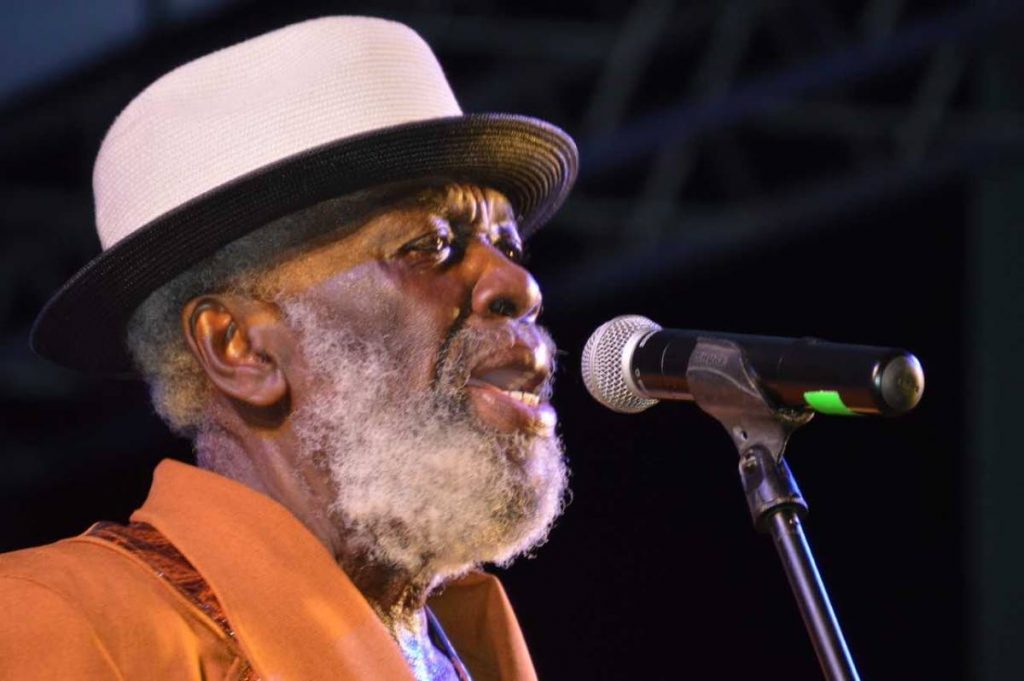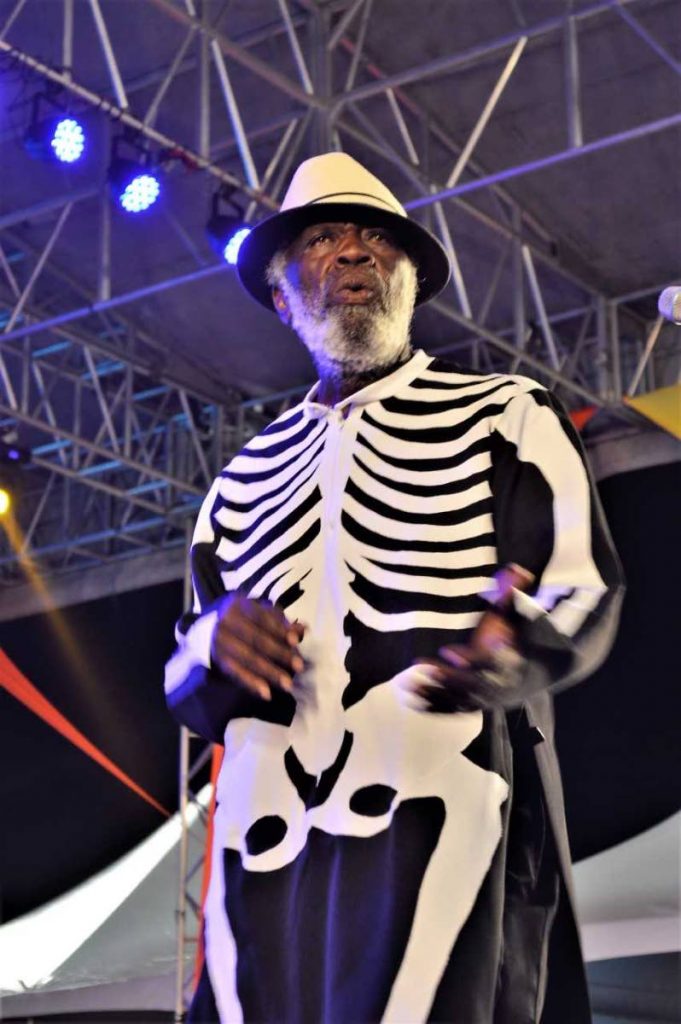Shadow’s vibe

CALYPSO connoisseurs knew beyond a shadow of a doubt that the late Winston Bailey, the Mighty Shadow, possessed a presence like no other calypsonian in TT’s history. What’s even more important is that grassroots calypso fans felt Shadow’s uncanny vibe as well.
Dressed in a floppy black hat and black robe, Shadow left audiences spellbound. Sometimes stomping around the stage before settling in front of a microphone stand; sometimes appearing like an apparition creeping up to the microphone, he offered his own version of a rebel yell before delivering offbeat, often-autobiographical stories, which represented society’s outcasts longing for love and some semblance of fairness.
In many ways, Shadow’s musical career fell between his Bassman from Hell and a Stranger who express their pain and joy through music. He would have liked “to forget calypso and plant peas in Tobago,” but music haunted him. The characters in Shadow’s musical narratives ache for acceptance; yet their strength is undeniable.
The fact that calypso judges denied Shadow his rightful place as a national calypso monarch for so long strengthened his musical resolve and earned him more respect in the calypso world. He was the people’s king.
Born in Trinidad on October 4, 1941, Shadow grew up with his grandparents in Les Coteaux, Tobago. His grandfather, a musician and choirmaster, gave him chores: taking care of the donkeys and the goats.
Later, when he fashioned his own music, Shadow filled it with the haunting heart of Africa filtered down to him in Tobago. He always recalled music made from wooden drums, covered with goatskins and heated over a crackling coconut branch, that kept time for a fiddler.
At 16, eager to live his musical dreams, Shadow caught a boat to Trinidad and stayed with his father in John John before moving to Laventille.
He learned some carpentry, but abandoned that job when he nearly fell off a roof. He tried to get into a calypso tent, but said, “I tried too early. I tried too much.” He secretly wrote songs for calypsonians.
His first break came in 1970, with Syl Taylor at the Young Brigade. The following year, Lord Blakie beckoned him to sing in his tent on Wrightson Road. That first night, Shadow appeared in short jeans and T-shirt “and I hadn’t combed my hair for a week,” he said. When Blakie asked if he came to sing, Shadow said, “No…. From there, I decided to deal with my feelings,” he said.

Shadow quickly found his footing. In 1974, he made the National Calypso Monarch finals challenging Slinger Francisco, the Mighty Sparrow. When the judges crowned Sparrow, the people rebelled, unleashing Shadow’s Bassman on the streets. Shadow was crowned Road March King.
He would become National Calypso Monarch in 2000 with What’s Wrong with Me? and Scratch My Back. The following year, he became International Soca Monarch and Road March King with his Stranger, the story of a tourist discovering soca music.
Among the accolades he now garnered, few people mentioned Shadow’s bold bass lines, which made him a defining voice in the transition from calypso to soca. Maestro increased the tempo, turning slow calypso into peppy soca; Lord Shorty infused East Indian vibrations with calypso for his version of soca.
But Shadow gave soca its heartbeat: deep, bouncing bass lines that propelled the music forward in a mesmerising rhythm that knew no boundaries – culturally or generationally.
In the 70s, Shadow’s music made more inroads in American black radio stations than any other calypsonian’s and in the 90s his music appeared on CD compilations of international music produced by the US company Music for Little People.
His early music, sometimes dark, but often infused with his wry sense of humour. explored love, the power of music, the trials and tribulations of ordinary men, poverty, injustice and jealousy.
“When You Have Nothing.” he sang, “all the things you cannot give her someone else can give her...”
He expressed rage in Dat Soca Boat: “My blood boiling. He came in my house to beat me. He came in my house to fight me. I belong to the house of music.”
Constantly offering hope to the struggling man, Shadow sang Do Good. “If you do good, good will follow you. If you do bad you are always in war with your conscience. It squeezes you up like a tight pants.”
Keep on Wailing demonstrated how Shadow’s bass lines – not the tempo – provided the energy for his music. “Remember life is social. Don’t waste it like a robot,” he advised a man hesitant to dance. He revisited that theme in Dingolay, a compelling tribute to music’s power to make people dance. Shadow always had an affinity for those who are socially awkward.
In Without Love he sang, “Life is like torture…man is like a fish out of water; hell and earth are the same thing.” Versatile to the core, he tackled political commentary in Snakes (in the Balisier) and social commentary in Revolution and No War. He took on copyright infringement with Pirates.
He even had a song that tackled the issue of marijuana, Frisco Donkey, which told the story of Frisco, who planted a field of marijuana, which is lost to his ravenous donkey. “Now the donkey is prancing and dancing.”
Shadow constantly reinvented himself. With the advent of hip-hop-influenced soca he had teenagers blasting his Poverty is Hell on their boom boxes. He fought for calypso innovation in the 80s with his own calypso tent, Shadow’s Master’s Den, where he gave Blue Boy (now SuperBlue) a break when every calypso tent turned his Soca Baptist away. Rumour had it that he defied Prime Minister Eric Williams’ request to shelve Blue Boy. This Shadow would never confirm, only answering the question with a giggle.
Shadow’s calypso tent was home to Cro Cro, Luta, Count Robin, Trinidad Rio, Gypsy, an American – Lady Complainer, and countless calypsonians no one else would take a chance on.
Shadow said he knew his fate from the time he was eight years old and heard his first calypso.
“I knew from that moment what I wanted to do with my life.”
Shadow received the Humming Bird Medal (silver) in 2003. At his death, he was just days away from being awarded an honorary doctorate from the University of the West Indies.
Once again, it seemed the recognition he deserved came too late.
In the end, Shadow will be remembered as one of calypso’s most innovative voices: a traditional calypsonian and soca pioneer, who left a legacy of timeless creativity and individuality; a man with an incomparable sense of fairness, honour and humour. He found solace in the music that sustained him.


Comments
"Shadow’s vibe"